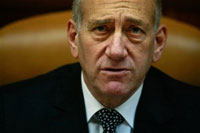Israel to give up West Bank and east Jerusalem for peace with Palestine
Israel will have to give up virtually all of the West Bank and east Jerusalem if it wants peace with the Palestinians, Prime Minister Ehud Olmert said in a farewell interview published Monday, saying his country faced a stark choice and needed to make a decision soon.

Olmert, who began talks with the Palestinians and Syria during his soon-to-end term, also said Israel would have to leave the Golan Heights in order to obtain peace with Syria.
The comments were the clearest sign to date of Olmert's willingness to meet the demands of Israel's longtime enemies in peace negotiations. But their significance was uncertain, since Olmert's days in office are numbered and peace negotiations will soon become the responsibility of a different Israeli leader.
More than anything, the interview marked Olmert's transformation from a vocal hard-liner who for decades opposed any territorial concessions to the Palestinians to a leader whose views are virtually identical to those of the dovish politicians he once pilloried.
"We have to reach an agreement with the Palestinians, one meaning that we will withdraw in practice from nearly all of the territories, if not from all of them," Olmert told the daily Yediot Ahronot.
The Palestinians claim all of the West Bank, Gaza Strip and east Jerusalem - areas captured by Israel in the 1967 Mideast war - for a future independent state. Israel withdrew from Gaza in 2005, but retains overall control over the West Bank and all of Jerusalem.
Olmert said Israel would keep "a percentage" of the West Bank but would have to give Palestinians the same amount of Israeli territory in exchange, "because without this there will be no peace."
He said Israel would have to leave parts of east Jerusalem, which the Palestinians claim as their future capital, saying Israel couldn't hope to maintain its control of the more than 200,000 Palestinian residents there.
He mentioned three recent attacks in which east Jerusalem residents have rammed Israelis with vehicles, killing three people and wounding dozens. He said anyone who wants to stop the attacks "must give up parts of Jerusalem."
There would be "special arrangements" for the city's holy sites, he said, without offering details. East Jerusalem is home to key Jewish, Muslim and Christian holy sites, and resolving the competing claims to the area is the most contentious in peace talks.
As mayor of Jerusalem and a hard-line lawmaker, Olmert long opposed any compromise in the city and encouraged efforts to build Jewish neighborhoods in the largely Arab eastern sector to cement Israel's control.
"I'm the first one who wanted to enforce Israeli sovereignty on the whole city. I admit this," he said. Olmert said that for decades he "was not prepared to look at reality in all of its depth."
Olmert said time was "so short that it is terribly distressing." In its attempts to make peace with the Palestinians and Syria, he said the decision Israelis now had to make "was a decision that we have been refusing to look at open-eyed for 40 years."
David Baker, a spokesman for Olmert, confirmed the content of the interview was accurate.
Despite the bold words, Olmert did very little to change the situation on the ground during his term in office. Israel settlements continued to expand, and authorities made no substantive move toward removing dozens of unauthorized outposts in the West Bank.
Palestinian negotiator Saeb Erekat said Olmert had not translated the conciliatory ideas he put forward in the interview into formal offers during nearly a year of peace talks.
"We have been having serious negotiations with the Israeli side, but up to this moment we have not received any written proposals from the Israeli side and Mr. Olmert," Erekat said. The Palestinians want to put the progress made so far in writing so that talks won't have to start from the beginning with Israel's next prime minister, he said.
Silvan Shalom of the hard-line Likud Party criticized Olmert - a former Likud member who helped found the centrist Kadima party in 2005 - for adopting the views of Israeli doves, and called Olmert "naive."
Any West Bank pullout would allow the Islamic militant group Hamas to take over there just as it seized power in Gaza after Israeli pulled out, Shalom said.
Olmert has been forced to step down by corruption allegations, and will depart officially once Kadima's new leader, Foreign Minister Tzipi Livni, forms a new government or elections are held.
Though Olmert might remain in power for several more months, his conversation with Yediot Ahronot was a farewell interview in which he summed up his time in office and defended his actions as Israel's leader.
Olmert said he would continue to try to strike a deal before he leaves office.
Israel "should not put off the decision," he said. "Either I will finish it, or Tzipi Livni will, or whoever comes after her."
Peace talks were launched at a U.S.-sponsored conference last November, but negotiations have not yielded dramatic results and the sides have all but abandoned the goal of reaching a deal by the end of 2008.
Olmert seemed to suggest the Palestinians were not matching what he described as Israel's far-reaching compromises. "Unfortunately, the Palestinians don't have the necessary courage, strength, internal determination, will or enthusiasm," he said.
Olmert, who recently started indirect peace talks with Syria, said Israel would have to give up the Golan Heights in return for a peace deal, a move that would be unpopular among Israelis. Israel captured the strategic plateau from Syria in the 1967 war.
Asked about Iran's nuclear program, Olmert said talk of a unilateral Israeli strike was "part of our delusions of grandeur." Iran was the world's problem, not just Israel's, he said.
"The thought that if America, Russia, China, Britain and Germany cannot deal with the Iranians we Israelis can ... is an example of a loss of perspective," he said.
Subscribe to Pravda.Ru Telegram channel, Facebook, RSS!




